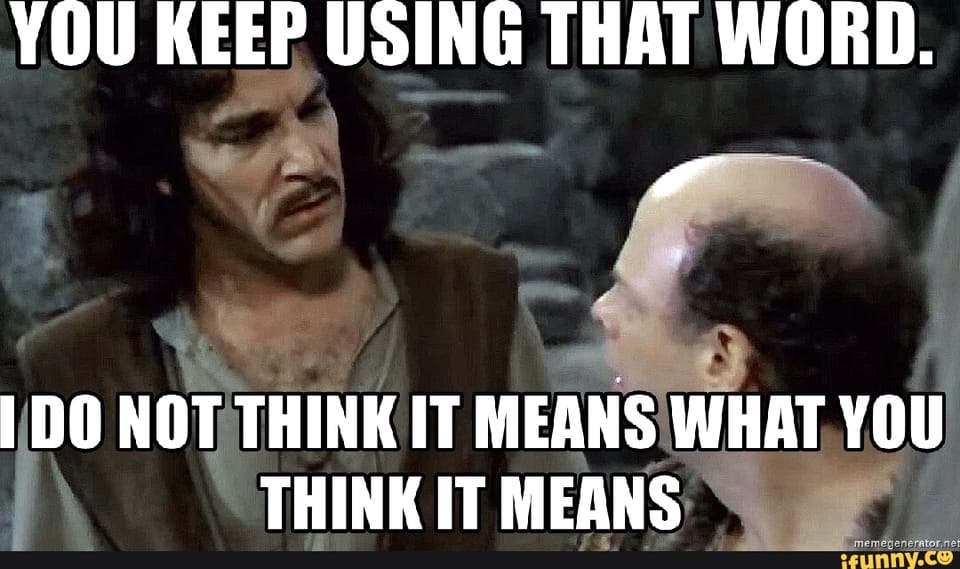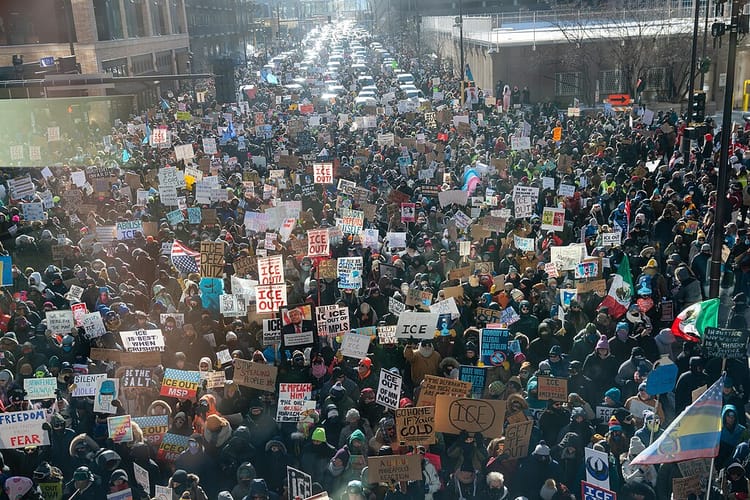The Overton-Window-Sized Hole in Most "Moveable Middle" Strategies

I was talking to some climate folks recently and wondered aloud about something I didn't think was particularly controversial: when was the last time we got updated data and intel on this "moveable middle" that we're constantly about, these moderates that can be swayed this way or that with the right messaging or ideas? I was jetlagged and tired and not being particularly articulate, and I was caught off guard at how defensive people were, so I let them talk at me about their data and surveys and research until everyone felt better. But this is the space where I get to think a little more before I speak and what I wanted to talk about then, and will proceed to talk about here is not whether or not the moveable middle exists—I know they do, I have actually read all the studies and surveys too, and I know that we've even dissected them into well-defined subgroups—but whether the climate movement's approach to moving them is actually working.
What I've seen, and I hope people will send me examples that prove me wrong (genuinely, I do!) is a lot of message testing and a lot of message-adjusting as a result of that testing, all of which has led to perfectly sensible and moderate narratives and language and policy ideas and narrative frame that these people tell us in surveys will appeal to them. When I raised an eyebrow at the "moveable middle" idea, one person huffed, "well the right certainly thinks they exist, look how far they've moved them in the U.S.!" True, but that hasn't happened on account of fine-tuned center-right messaging—or to put a finer point on it, it hasn't happened solely on account of fine-tuned center-right messaging. Moderate messaging and ideas targeted at the moveable middle is like the closer you send in to seal the deal; but before that, you need to prime people to make the purchase. You need a hype man (a fluffer? the perfect metaphor is escaping me), and the right has had them in spades for decades. From the freedom-loving billionaires of the libertarian Tea Party revolution to the unhinged conspiracy theorists of today's MAGA right, the American conservative movement has leveraged its radical flank to make slightly less radical, but still very right-wing, ideas palatable to people who consider themselves moderates. It's a strategy that's sometimes referred to as the Overton Window effect, a term I hear a lot of climate folks and progressives invoke too, but one they don't seem to actually understand how to implement.
For the Overton Window effect to work, the radical flank needs some sort of legitimacy, it can't constantly be getting punched and scolded by the establishment. On the right, extremist think tanks and thought leaders are routinely platformed, not only by more mainstream Republican politicians and organizations, but by the mainstream media as well. In the climate movement and on the left, oftentimes the first ones to criticize the radical flank are the more moderate members of their own group, shutting the "window" before anyone has a chance to crack it open a bit. The last time I saw the U.S. climate left effectively use the Overton Window effect to shift the moveable middle was probably the introduction of the Green New Deal in 2019.
It was a perfect storm: the 2018 IPCC report had scared the crap out of everyone (when scientists are your radical flank, it's easier to lend them credibility I suppose) and kicked off large and very public youth climate protests around the world. Sunrise Movement had started agitating more vocally and visibly for climate action at the state and federal level. Standing Rock had united a lot of previously disparate components of the climate movement. And yet still, almost before AOC could finish the Green New Deal press conference, some of the loudest voices in the room on climate were condemning the idea for being too broad, too radical, just too much in general. Why on earth would you gum up the climate works talking about labor rights and child care?!! But thanks to the broader movement's ability to support the radical flank—or just to keep their criticisms to themselves—these ideas were left in the ether long enough for people to engage with them, and in a couple years it was considered perfectly normal to talk about a "just transition," and weird if you didn't. When I talk to people who have been working on this issue longer than I have, they'll talk about how the Earth Liberation Front provided excellent Overton Window leverage back in the day. "It made it so we could be like 'hey, you can deal with them lighting things on fire, or you can deal with us, who wear suits and come into your office," one former Sierra Club staffer quipped to me.
What happened to that tolerance for risk? Or not even risk, just tolerance for other ideas and approaches existing? Or just ability to stfu sometimes and not assume that your take is the only take? These days, rather than letting more radical ideas marinate long enough that slightly less radical, but still progressive, policies seem palatable, centrist Democrats—and many climate advocates along with them—seem to think appealing to the moveable middle means tamping down on anything that might scare people off, sticking to moderate messages only, condemning the radical flank and distancing them from the broader movement, and, in the Democrats' case, campaigning with the Cheneys. The Cheneys!
The right, meanwhile, has somehow picked up on something that every marginalized person I've ever met knows just from living their lives: when you find yourself thinking if you could just make yourself small enough to be palatable, then the group might accept you, you eventually realize that there is no small enough. You will fold and bend yourself into oblivion and it will never work. The only option is to insist on big, insist on loud, and hope that someone who looks and sounds like them will suggest a watered-down version of your ideas and they'll go for it.
It feels relevant to note here that the term Overton Window actually comes from a rightwing think tank guy, Joseph Overton, who was a policy analyst for The Mackinac Institute, a partner of the Atlas Network (the global network of 500-odd libertarian think tanks we've covered before). No surprise, since the primary function of these think tanks is generally to "spitball" wildly reactionary ideas in service of making slightly less reactionary ideas more palatable. Think tanks on the left, meanwhile, continue to worry about not appearing biased, about incorporating conservative views for "balance."
As we've been covering for more than a year now, repression of protest, activism in general, and journalism related to climate is increasing all over the world. Now is not the time for the climate movement to say "yes you're right, those kids really are too disruptive, shame on them." I'm not suggesting that people publicly support tactics they don't approve of, but perhaps just...shut up once in a while? Let a protest tactic you don't agree with slide now and again? Skip the op-ed about how the fringe climate radicals are turning people off? Leave the armchair criticism for another day?
What makes the Overton Window effect work is its ability to widen the frame of what's possible; that can't happen if people who are on the same side keep immediately narrowing it, slamming the window shut the second someone has the audacity to open it a bit.
Latest Climate Must-Reads
- Sorry not sorry I'm gonna start off with some belters we've been putting out at Drilled that I hope you'll read if you haven't already:
- Unrest in Carbon Country, by Molly Taft, looks at the Summit pipeline in the Midwest as an example of everything that's wrong with the U.S. embrace of carbon capture, and how it's being used not just to perpetuate fossil fuels but also breathe new life into the corn-based ethanol industry.
- Our Australia reporter Royce Kurmelovs and I partnered up on a three-part series about IPIECA, the former UNEP sub-group-turned consultant NGO that the fossil fuel industry uses to influence the IPCC and COP. Check out parts one, two and three.
- Biden administration warns natural gas expansion would drive up domestic costs, by Nina Lakhani for The Guardian - the long-awaited report on liquefied natural gas from the Department of Energy—the report that LNG export terminal permits were "paused" for—is out and it's...refreshingly honest? It notes that LNG today is primarily replacing renewable energy, not coal, which blows the industry's argument for it being a climate solution out of the water, and it also notes that increased LNG exports jack up prices at home.
- Lots of great coverage of the International Climate Justice hearing on climate justice. I'm partial to ours, from Isabella Kaminski, of course, but also found Bob Berwyn's write-up for Inside Climate News a great read.
- A Strange New Climate Era Is Beginning to Take Hold, by Shannon Osaka, Maxine Joselow and Sarah Kaplan for The Washington Post - The latest data on climate is bad. We are increasing emissions, not reducing them; warming is happening faster than predicted, and many climate scientists say earlier models were conservative if anything. Some of WaPo's top climate reproters face this truth head on in this piece looking at what the next ten years holds.





